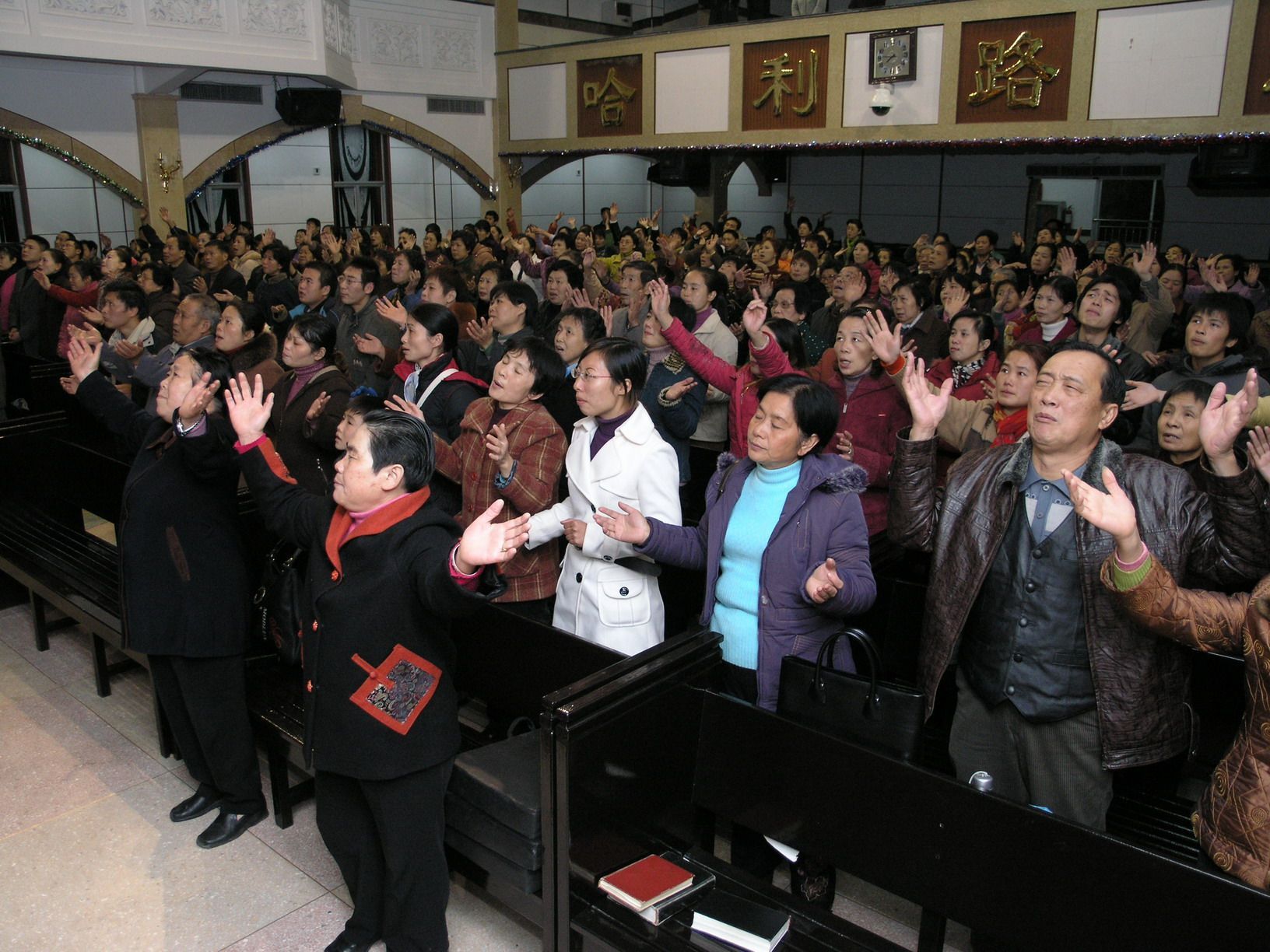The Jesus Family (1930s)

Jing Dianying, founder of the Jesus Family.
Jing Dianying was born in Shandong in 1890 and grew up in a Buddhist family with strong Confucian traditions. It was not until he entered middle school at Tai’an in 1911 (when he was aged 20) that he heard the gospel for the first time.
Although he first believed in Christ around 1913, it appears Jing was not serious in his Christian faith until he came into contact with Pentecostals in the early 1920s.
After he was born-again, Jing read in the Bible: “Husbands, love your wives" (Ephesians 5:25). This command immediately placed him in a dilemma, as he had divorced his wife and sent her back to her mother several years earlier. He later said, “She had bound feet, and was not my equal, and I didn’t love her.” 1
A few days later, out of obedience to the Scriptures, Jing walked to his wife’s village and brought her back home. As she couldn’t easily walk because of her feet, Jing borrowed a wheelbarrow and pushed her the 15 miles (24 km) home. A missionary-doctor, Vaughan Rees, later wrote,
“As soon as they entered the door of his home together the Holy Spirit descended on them both. This was in 1920. In 1940 I received a broken-hearted letter from him. His beloved wife was dead. She had proved his equal and beloved companion for 20 years. Contrary to his former opinion, she was the backbone of the work which had started in 1921.” 2
Jing and his wife knelt together and dedicated themselves to unreservedly obey the Bible. One of the first things they did was sell all their possessions and give the money to the poor.
In the beginning, Jing's church movement was called the Fellowship of the Saints, but there were few members. As the movement grew, the name was changed to the Jesus Family. Together, believers pooled their resources and purchased 43 acres of land in the village of Mazhuang, near Tai'an in central Shandong. The property came to serve both as headquarters for the church and as home to a flourishing community of believers. The group’s five-word slogan encapsulated their commitment to Christ and their pattern of frugal living: 'Sacrifice, abandonment, poverty, suffering, death.'
The radical vision of the Jesus Family was for members to be a unified body where everyone shared all possessions regardless of their background. In each Family, a respected married couple was appointed to be the 'parents' of the group. The men were responsible for leading evangelism and Bible teaching, while the women took responsibility for home and family life. People were given work to perform, thus benefiting the entire community. Work projects included the farming of livestock, carpentry, boot-making, electrical work, and baking and cooking.
Each day in Mazhuang village began with communal prayer at 4:00 a.m., when,
"There would be fervent simultaneous praying. Likewise the day ended with prayer and testimonies. In their worship the community liked to sing whole Psalms or chapters of the Bible.
Five hundred people shared the area of 43 acres, or less than one-tenth of an acre per person; while the Communists worked on one person requiring one acre for food.... The Jesus Family won the amazed admiration of many Communists; for its honest and thrifty members, marked by their love for one another and by unselfish service to others, were practicing some of the ideals preached by Communists, but much better." 3
To outsiders, the main distinguishing feature of the Jesus Family was the tremendous love the members had for one another. The elderly were treated with the utmost respect, and children raised in a loving environment. Each day began and ended with a group Bible study. On Sundays, all members of the Family came together for worship.
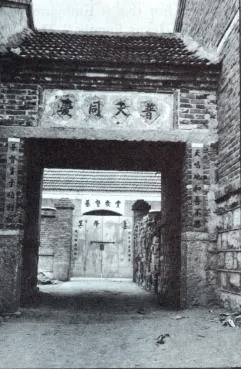
The entrance to the Jesus Family property at Mazhuang.
In 1930, the Jesus Family began to tithe one-tenth of the harvest of their land to the poor. God blessed their crops to such a degree that in 1942, when a severe famine blighted north China, they decided to give away 20 percent of their harvest. One of the leaders, Heng Shin, later testified, "The Lord blessed us. We felt we should add a tenth each year. This year we are giving away nine-tenths." 4 Incredibly, on 43 acres of land the Jesus Family were able to support 500 people and still give away 90 percent of their harvest to the poor.
As the movement grew, Jesus Family members visited many towns and villages, preaching the gospel as they walked from one place to another. Their example of communal living and deep Christian love attracted those searching for life's answers, especially the homeless, destitute and despised. Many blind people and beggars joined the Family and found eternal life in Christ. Life was far from easy, however, and often when the believers entered a new town the entire population would come out to beat, scorn and humiliate them.
The Chicken and the Egg
The moral transformation of members of the Jesus Family was far-reaching, and one incident of brazen honesty resulted in God receiving glory. During the civil war that was raging throughout China, the Jesus Family decided not to take sides in the conflict, but to demonstrate the love of God and preach the gospel to all who would listen.
One of the Jesus Family leaders was arrested and thrown into jail for sheltering a Nationalist soldier. One day, his wife was deep in prayer when a chicken wandered in from the street and laid an egg. The woman's conscience wouldn't allow her to take the egg laid by someone else's chicken for free, but she didn't know who the owner was. She caught the chicken and tied a note to its leg along with a banknote to pay for the egg, and released it back into the street.
The owner of the chicken was astounded when he received the note and payment, and soon news of the deed reached the Communist judge in the area. He investigated the matter and was amazed to discover the existence of such honesty. The judge dismissed the case against the pastor and immediately released him from jail.
The Jesus Family was the first Christian group in China to have a vision to take the gospel, by foot, from China all the way back to Jerusalem. Their workers carried baskets of food and essentials as they walked across the country. The movement grew rapidly, and by 1941 there were 141 different Jesus Family communities in eight provinces, the majority of whom lived in Shandong, with approximately 6,000 members.
Criticism
It appears that after a time the Jesus Family lost their direction. What began as a wholesome ideal of communal living ended up going too far and the movement appeared to be on the verge of becoming a cult. One report lamented,
“Except for the youngest married couples, men and women lived in separate buildings. Engagements and weddings were arranged by Jing, the Family head. It happened that young teenagers were made to marry old men, the pretty were matched with the crippled, and educated ones with the illiterate.
Husbands and wives seldom had a chance to live together, for there were just a few rooms allotted to married couples which had to be shared by them in turn. Nurseries took care of the young children. Quite often, children of three to four years old did not know who their parents were.” 5
One of the main points of alarm regarding the Jesus Family among other parts of the Body of Christ was their extreme positions on certain teachings. One observer wrote,
"In doctrine the movement stresses the filling of the Spirit to the neglect or exclusion of the doctrine of redemption through the cross of Christ. There is a tendency to elevate personal experience above the Word of God as a criterion in spiritual matters. Often the Word of God is not used as a basis for sermons, and when it is used, it is interpreted in a highly allegorical way, without regard for the common-sense meaning or the principles of true exegesis." 6
Persecution
In October 1949, when Mao Zedong established the People's Republic of China, there were 20,000 people enlisted in more than 100 different Jesus families throughout the country. The movement had spread to Manchuria, Inner Mongolia, and across south and central China.
At the start, the government seemed to view the Jesus Family with both admiration and fear. They knew the movement was markedly different from all other Christian groups in China, and that they practiced many of the ideals that Communism promoted. On the other hand they feared the Jesus Family because they could not control them. It was a completely indigenous movement, receiving no money from overseas and having minimal contact with foreign Christians.
Jing Dianying later told a friend, “Little did I think…how the Lord would lead, or what He had in store for me. How foolish and ignorant I was. Now I see what He has done. He has raised us up for this purpose, that the Communists might see what Christianity is.” 7
Even the official Three-Self Church magazine, Tianfeng, published complimentary articles about the Jesus Family in 1951. One reporter was moved to say,
“It is really touching to see their earnest and down-to-earth spirit of life. Solid and hard-working, from childhood they are taught to bear hardships for the Lord. I have seen the most holy and beautiful faces in the world among these elders and the brothers and sisters in the Family. They love the Lord, love people, love poverty, love production, and love labor.” 8
In 1952 the government decided they could no longer tolerate the Jesus Family. The headquarters at Mazhuang were seized and the buildings torn down, and the 500 Christians there were forced to dissipate back into society. Other fellowships of the Jesus Family throughout China continued to meet discreetly, but they too were heavily persecuted.
Just two years after the glowing report in Tianfeng, the same publication published a new article with a completely different tone. In February 1953, the magazine launched a series of politically-motivated diatribes against the Family, led by Jing’s nephew, Jing Zhendong. The increasingly aggressive denunciations included:
“In the past few decades, the Jesus Family has insulted the holy name of Jesus and endangered the Chinese people. From now on, this shameful name should not be heard again in New China. Jing Dianying colluded with Japanese invaders and the reactionary officers and officials of the puppet regime in the past 30 years; he also collaborated with the British and American imperialists, collecting information and engaging in anti-Soviet and anti-Communist propaganda.” 9
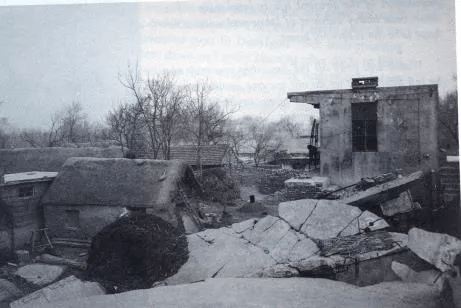
Part of the Jesus Family compound at Mazhuang demolished by the Communists in 1952.
After initially experiencing a 'honeymoon period' with the Communist authorities, the Jesus Family now found themselves outlawed and being severely persecuted. The characteristics of the movement "which were acceptable to the Communists were that it was indigenous and free from western influence, and initially at least it was communal. It was unacceptable to them in that it emphasized miracles, healing, the Second Coming and Sabbath; and these distinctive tenets more than outweighed any advantages which the Communist authorities might have found in it." 10
Jing was arrested and imprisoned in 1953, and his second wife Chen Bixi was assigned to work in a government hospital in Shaanxi Province. By 1955, "their communities had been liquidated, and their members scattered or killed.” 11 For several years there was no information about the fate of Jing Dianying. Then, in the spring of 1957, the founder of the Jesus Family contracted liver cancer, brought about by the filthy, unhygienic conditions in prison.
Knowing that he would soon die, the prison authorities released Jing on medical parole. He travelled to Xi’an, where his wife worked, and was immediately visited by Jesus Family leaders. According to some who visited him, “Jing’s faith was still strong and his voice clear.” 12 His condition worsened, however, and he passed away on August 31, 1957.
Jing Dianying’s body was wrapped in a white cloth and buried with neither a coffin nor a tombstone in a cemetery in the suburbs of Xi’an. Four days before his death he had written, “I am going home to see my Father, you wait here for the return of the Lord.” 13
The Jesus Family Rises from the Ashes
Many China-watchers believed the Jesus Family had been completely obliterated during the excesses of the Cultural Revolution from 1966 to 1976, but in the early 1980s they surprisingly re-emerged. The strong faith of the Family members had not deserted them during the decades of persecution. Dozens of the movement’s leaders had spent years in prison, and more than a few had received a martyr's crown.
Although they are not allowed to form into Christian communes like they did before 1952, there are still hundreds of Jesus Family congregations today in provinces like Shandong, Hebei, Shaanxi, Henan and Fujian. Some of the Jesus Family fellowships have joined the registered Three-Self Patriotic Movement, while others meet as independent house churches.
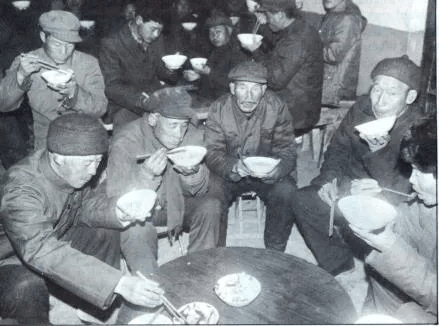
Members of the Jesus Family eating together in 1989.
Occasional reports emerged throughout the 1980s and 1990s, telling of hardships the Jesus Family was called to endure. In 1983, six believers from the group were "suspended from branches and beaten." 14
In 1992 the police crushed one of the Jesus Family fellowships at Duoyigou Village near Weixian in western Shandong. The believers there led peaceful lives, supporting themselves by breeding long-haired rabbits and making shoes.
The church at Duoyigou attracted the attention of the authorities when it exploded in size to 3,000 members, and on one occasion more than 1,000 believers flocked to the village to be baptized. There were so many people that the baptisms took ten days to complete!
Revealing how much the Chinese authorities still feared the love and self-sacrifice of these Christians, the police called in a helicopter to circle the normally peaceful village for hours. The 60-year-old leader of the community, Zheng Yunsu, was arrested and sentenced to 12 years in prison, while each of his four sons was sent to a coalmine labor camp for between two and four years.
Before being taken away to begin their sentences, Mr. Zheng and his sons were paraded through the streets, each with a sign around his neck that read, 'Member of the Jesus Family'. 15 Although the authorities intended the parade to be a humiliation and disgrace, the Zhengs rejoiced greatly that they had been counted worthy to suffer for the Name of Jesus.
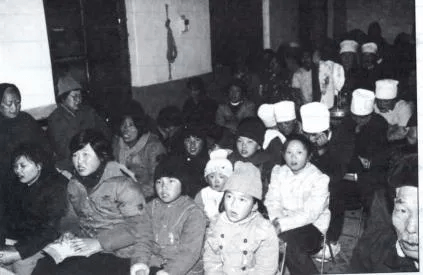
A gathering of the Jesus Family in 1992.
More trouble came in late 1993, when a group of 60 Jesus Family members in Shandong were arrested as they celebrated Communion on the first day of the month. Thirty of the leaders were charged with "holding illegal religious meetings, resisting arrest, and disturbing social order. [The authorities] destroyed the church hall with a bulldozer and took any belongings of value they could find." 16
Despite decades of severe and brutal persecution, the Chinese authorities have been unable to eradicate the Jesus Family. Left confused and red-faced, the government repeated the experience of Pharaoh many centuries ago, who found himself unable to subdue God's people. The Bible said of the Israelites, "The more they were oppressed, the more they multiplied and spread" (Exodus 1:12). The same dynamic happened to the Jesus Family in twentieth century China.
One of the last public communications from the Jesus Family came in 2001, when three imprisoned members were able to smuggle out a stirring letter addressed to Christians around the world. It is fitting to finish this section on the Jesus Family by reprinting their letter:
"To the Elders, brothers, and sisters of the worldwide Church. Peace.
As you read this letter, please know that we miss you very much. We are undeserving of your love and all your tears which we can never repay. May God remember your tears.
Today, for the sake of our loving God, we are in prison. We know that this is God's will for us. We present our bodies as a living sacrifice. In this matter we do not follow our own wishes or choices, for this is the road of the cross along which God helps us to walk and of which we are unworthy to walk by ourselves. We have experienced the difficulties and hardships of walking along this narrow path, but we have also experienced the sweetness and comfort of it. By walking on this road we are continually filled with the life of the heavenly kingdom. Our outer nature is wasting away, but our inner nature is being renewed daily.
Dear ones, we wish that you too will exert yourselves on this road. The time is short, and the Lord is coming soon! We know that you also have encountered difficulties, but you must not be disheartened or disappointed. Lay down your heavy burdens and walk! Our hope is in our heavenly home.
Watch and pray continually that you may not be left behind. If we do not see one another again in this world, we will meet again in our heavenly home when the Lord comes. Dear ones, wait patiently!
Now, another 18 sisters and eight brothers are waiting to be sentenced. We do not know how many years they will get for re-education. Brothers and sisters, don't forget to pray for your dear ones in prison.
Although the road is often very narrow, it will lead into the presence of the Lord. Even though our homes have been demolished, our minds will not change. We will faithfully march forward, our clothes stained with blood, as we go to see the Father.
Because of the situation we cannot write more.
Emmanuel!
Your brothers: Xiuling, Jingxiu, Fuqin. 17
The Enduring Legacy of the Jesus Family
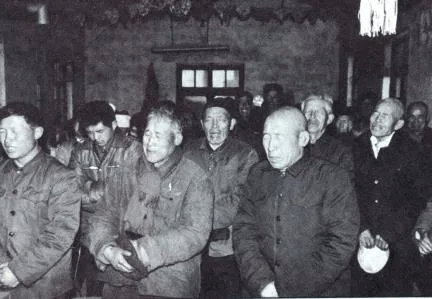
The Jesus Family earnestly praying together.
After decades of severe suffering, the Jesus Family continues to live on today in the consecrated lives of believers throughout Shandong and other provinces of China. Although most Family members don't identify themselves as part of that movement any more, tens of thousands of Christians in both the house church and Three-Self church systems trace their spiritual heritage back to the impact of the Jesus Family.
An incident in Guizhou Province in 2006 offers a glimpse into the hardships and blessings of this unique church movement. A group of believers had gathered together in Liupanshui to hear a house church preacher share about the Back to Jerusalem mission vision that God first gave the Chinese Church in the 1920s and 1930s. After three hours, an elderly lady in the back of the meeting stood to her feet and said,
"You don't know who I am, but I am the granddaughter of Jing Dianying, the founder of the Jesus Family. When I was a little girl I saw my father and grandfather arrested for preaching the gospel. I saw my family members sent to concentration camps by the Communists. I saw my mother abandoned by the Chinese community with no way of getting a job or feeding us children. I was not allowed to go to school. I was treated like a leper. Because of what my family did I was punished by society." 18
For many years the granddaughter of Jing Dianying had struggled with bitterness. She was bitter against the government, and bitter against her grandfather and father. Worst of all, she had become bitter against God, and had vowed to never become a follower of Jesus Christ.
Years earlier she had moved away from Shandong and married a government official. They had children, but she was determined to make sure they never became Christians either. Decades passed, and the gospel seed that had been lodged in her heart as a little girl sat dormant. She exclaimed to everyone in attendance,
"I am hearing the same exact words that I remember my father and grandfather saying so many years ago. The government may have killed my father and grandfather, and tortured their families, but they couldn't kill the vision! ... The vision of the Church in China still burns deep and even though I have denied it for most of my life, it still runs through my veins....
Though I may be old and have already wasted so many years, I promise from this day forth that I will not remain silent any longer. Another day will not pass without me sharing the Good News of Jesus Christ with everyone I can!" 19
© This article is an extract from Paul Hattaway's book 'Shandong: The Revival Province'. You can order this or any of The China Chronicles books and e-books from our online bookstore.
1. D. Vaughan Rees, The ‘Jesus Family’ in Communist China: A Modern Miracle of New Testament Christianity (Exeter: Paternoster Press, 1959), p. 37.
2. Rees, The Jesus Family in Communist China, p. 39.
3. Cliff, A History of the Protestant Movement in Shandong Province, pp. 67-9.
4. Paul E. Kauffman, Confucius, Mao and Christ (Hong Kong: Asian Outreach, 1975), p. 95.
5. “Introducing the Jesus Family,” Bridge (July-August 1992), p. 11.
6. Carlberg, China in Revival, p. 236.
7. Kauffman, Confucius, Mao and Christ, p. 95.
8. “The Taste of the Jesus Family,” Tianfeng (April 21, 1951).
9. Tianfeng (March 23, 1953).
10. Cliff, A History of the Protestant Movement in Shandong Province, p. 66.
11. Cliff, A History of the Protestant Movement in Shandong Province, p. 70.
12. “More About the Jesus Family,” Bridge (July-August 1993), p. 11.
13. “More About the Jesus Family,” p. 11.
14. China Prayer Letter (July 1987).
15. "Tracing the Jesus Family," Amity News Service (March 1995).
16. Pray for China (January-February 1994).
17. China Study Journal (December 2001), pp. 21-2.
18. Eugene Bach, Back to Jerusalem: The Thirty Day Devotional (Lumberton, MS: Back to Jerusalem), p. 147.
19. Bach, Back to Jerusalem, pp. 147-8.





